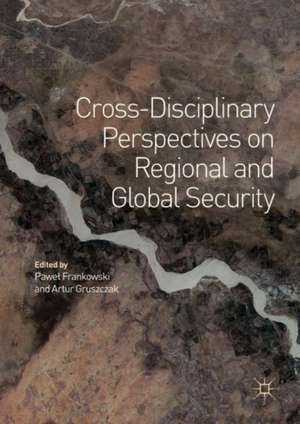Cross-Disciplinary Perspectives on Regional and Global Security
Editat de Paweł Frankowski, Artur Gruszczaken Limba Engleză Hardback – 20 apr 2018
| Toate formatele și edițiile | Preț | Express |
|---|---|---|
| Paperback (1) | 718.29 lei 6-8 săpt. | |
| Springer International Publishing – 25 dec 2018 | 718.29 lei 6-8 săpt. | |
| Hardback (1) | 723.35 lei 6-8 săpt. | |
| Springer International Publishing – 20 apr 2018 | 723.35 lei 6-8 săpt. |
Preț: 723.35 lei
Preț vechi: 882.13 lei
-18% Nou
Puncte Express: 1085
Preț estimativ în valută:
138.41€ • 144.88$ • 115.20£
138.41€ • 144.88$ • 115.20£
Carte tipărită la comandă
Livrare economică 31 martie-14 aprilie
Preluare comenzi: 021 569.72.76
Specificații
ISBN-13: 9783319752792
ISBN-10: 3319752790
Pagini: 234
Ilustrații: XV, 254 p.
Dimensiuni: 148 x 210 mm
Greutate: 0.48 kg
Ediția:1st ed. 2018
Editura: Springer International Publishing
Colecția Palgrave Macmillan
Locul publicării:Cham, Switzerland
ISBN-10: 3319752790
Pagini: 234
Ilustrații: XV, 254 p.
Dimensiuni: 148 x 210 mm
Greutate: 0.48 kg
Ediția:1st ed. 2018
Editura: Springer International Publishing
Colecția Palgrave Macmillan
Locul publicării:Cham, Switzerland
Cuprins
1- Introduction.- 2- EUROscepticism and Monetary Security in Europe-Riedel.- 3- European space security and regional order-Słomczyńska.- 4- Role of Sub-National Actors in North American security-Frankowski.- 5- Regional security in the twenty-first century’s South America: Economic, energy, and political security in MERCOSUR and UNASUR-Meissner.- 6- The distinctiveness of the Latin American security system – why is it so different? Public international law perspective-Kleczkowska.- 7- Security at the centre of post-2000 EU-Africa relations-Reich.- 8- Boko Haram and Identity Reconstruction in Lake Chad Basin Region-Fubara O.B. and Miapyen S.B..- 9- Peacekeeping in the African Union: gender, women and the battle against sexual exploitation and abuse-White.- 10- Women’s Participation in Peace Processes in East Africa – selected aspects-Cichecka.- 11- International River Basins as Regional Security Communities: The Okavango River case-Castro.- 12- Conclusion: drifting apart regional security orders.-
Notă biografică
Paweł Frankowski is Assistant Professor in the Institute of Political Science and International Relations at the Jagiellonian University, Poland.
Artur Gruszczak is Associate Professor in the Institute of Political Science and International Relations at the Jagiellonian University, Poland.
Artur Gruszczak is Associate Professor in the Institute of Political Science and International Relations at the Jagiellonian University, Poland.
Textul de pe ultima copertă
This book focuses on current key issues of international security from an actor-centered approach. The volume is divided into 3 sections: the first part analyses an array of security issues in Europe, the second one explores how those security issues play out in Americas and the third focuses on Africa. Each of the chapter authors outlines the relevant ideas, interests and institutions. The volume provides an overview of how global, regional, and national actors, differ in their management approaches, capacity levels, and how these differences translate into cross-regional cooperation on security issues.
Paweł Frankowski is Assistant Professor in the Institute of Political Science and International Relations at the Jagiellonian University
Artur Gruszczak is Associate Professor in the Institute of Political Science and International Relations at the Jagiellonian University
Caracteristici
Develops and embeds understanding of the problems and challenges of contemporary global security Provides a framework for analysis of the security institutions in a cross-disciplinary manner Argues that problem solving rather than power seeking characterize operational implications of contemporary regional security institutions
